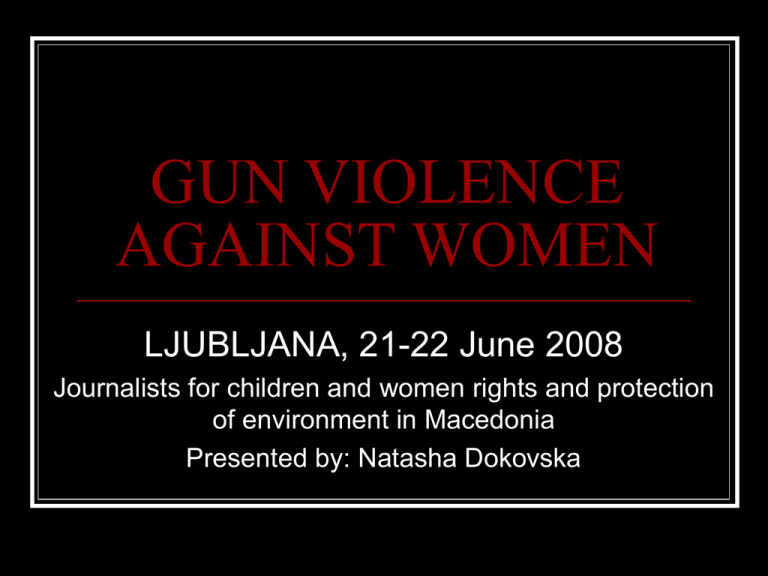
GUN VIOLENCE
AGAINST WOMEN
LJUBLJANA, 21-22 June 2008
Journalists for children and women rights and protection
of environment in Macedonia
Presented by: Natasha Dokovska
Violence against women
Article 1 of the UN Declaration on the
Elimination of Violence against Women states
that:
“The term ‘violence against women’ means
any act of gender-based violence that results
in, or is likely to result in, physical, sexual or
psychological harm or suffering to women,
including threats of such acts, coercion or
arbitrary deprivation of liberty, whether
occurring in public or in private life.”
Violence against women
Gender-based violence
According to the UN Committee on the Elimination of
Discrimination against Women, gender-based violence
against women is violence
“directed against a woman because she is a woman or
that affects women disproportionately.”
Such violence takes many forms, among them murder;
stabbing; beating; rape; torture; sexual abuse; sexual
harassment; threats and humiliation; forced prostitution
and trafficking.
Violence against women
Violence may be physical,
psychological, and sexual. It may be
Manifested through deprivation or
neglect as well as through overt use of
force or harassment in peace or in
war/conflicts.
Violence against women
Perpetrators include, but are not limited to:
A) Intimate partners and other members of the
family;
B) Employers (including of domestic workers),
superiors and colleagues at work;
C) State officials, such as police, prison
guards, soldiers, border guards, and
immigration officials;
D) Members of criminal gangs;
E) Members of armed groups.
Violence against women
Women are victims of violence:
In the society
In the Family
On the Job
Guns violence
Violence against women
For every woman killed or physically injured by firearms,
many more are threatened.
Most women who are victims of gun violence experience
multiple types of abuse beforehand, including sexual,
psychological and/or physical attacks. Patterns of attack are
similar across cultures and often involve shooting family pets
as a warning or bringing guns out for cleaning during an
argument. As many women are emotionally involved and
economically dependent on those who abuse them it can be
extremely difficult to leave the situation.
Violence against women
NGO – Journalists for children and women
rights and protection of environment in
Macedonia made few research on the
issues of guns violence under the women
in the country
Violence against women
A gun increase the chance of death by 12
times compared to other means of
violence.
According our last research each third
women is victim of family violence, but
each forth women is victim of gun violence
Violence against women
In our country domestic Violence is a public
health epidemic that is greatly intensified
with the easy access and availability of
firearms
The research say that 47% of domestic
violence homicides are from firearms.
Violence against women
Domestic violence homicides are 6.2 times
more likely to occur in homes with guns
than homes without guns.
In homicides where the weapon was
known, 38% of female homicide victims
were killed with a firearm. Of those female
firearm homicides, 82% were killed with a
handgun.
Violence against women
Guns are used by domestic abusers:
to gain control and power in a relationship
Violence against women
In Macedonia the reasons for abuse
are:
Alcohol
Jealousy
Economic dependency
Ethnic intolerance
Violence against women
Intimate partner violence is the most
common form of violence in women’s lives
worldwide.
In Macedonia, according JCWE’s research
at least one in every forth women will be
physically abused at least once in their live.
Violence against women
The women in Macedonia are abused in
their own home
The abuser is very well known by victim.
It’s:
husband
boyfriend
or other male relatives
Violence against women
While gun related domestic violence occurs in peaceful
settings as well as in conflict zones, domestic abuse
increases during and after conflict.
After a conflict officially ends, guns circulate in the
community.
Post-conflict stress, combined with economic prospects and
a reduction in basic services, contribute to the dynamics of
domestic violence after war.
In Macedonia after the war conflict in 2002, more than 63 %
of women was victims of domestic violence, often at the
hands of men who had kept the small arms they used during
the war.
Violence against women
Justice systems have historically overlooked
violence against women, and human rights
standards have tended to perceive the ‘private
sphere’ as outside the scope of state
interventions.
While legal protections for women experiencing
domestic violence exist in 45 countries, many of
these laws are not regularly enforced, especially
during periods of conflict where domestic violence
incidents are likely to be seen as irrelevant to the
broader issues of conflict.
Violence against women
Unfortunately Macedonian government
have not ratified the UN Resolution 1325
with which will be exist one of mechanism
for protection of women in post-conflict
period.
Violence against women
JCWE in collaboration with other women NGO in our country
and other regional women organization work on few
campaign to draw attention to intimate partner violence.
In the frame of the effort of IANSA and other international
partner organization we work to:
Introduce strong domestic small arms legislation reinforced
by rigorous regional and international agreements as an
essential step to improve the safety of women against gun
related domestic violence.
• Support the development of gender-sensitive international
agreements concerning small arms and peace building.
Campaign to lobby for ratification of UN Resolution 1325







